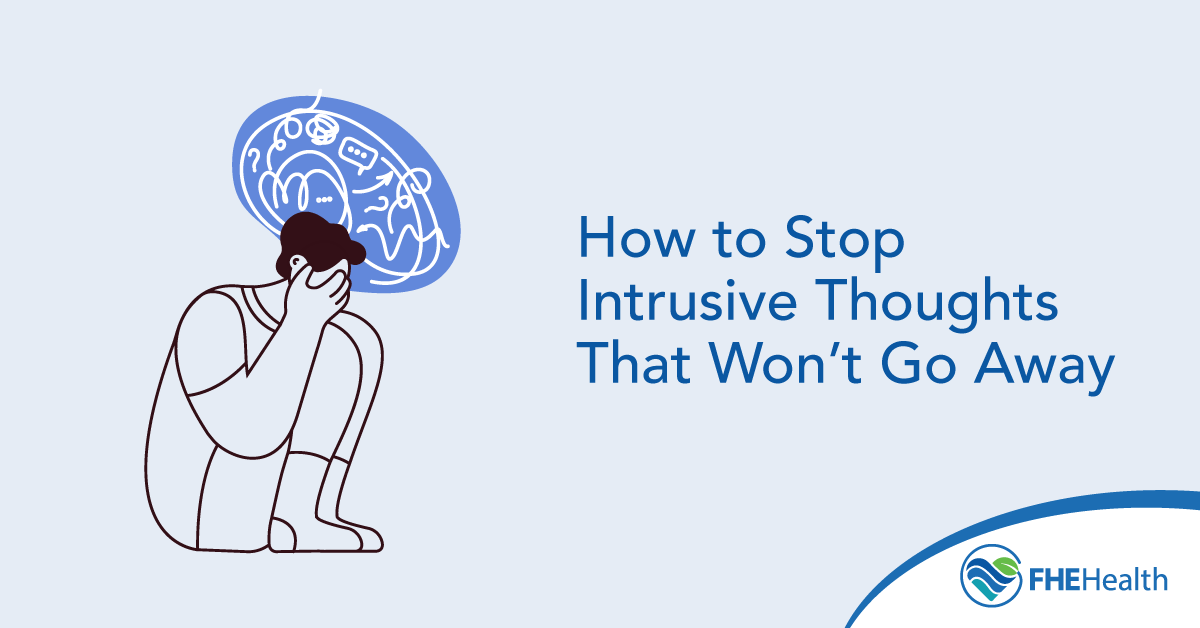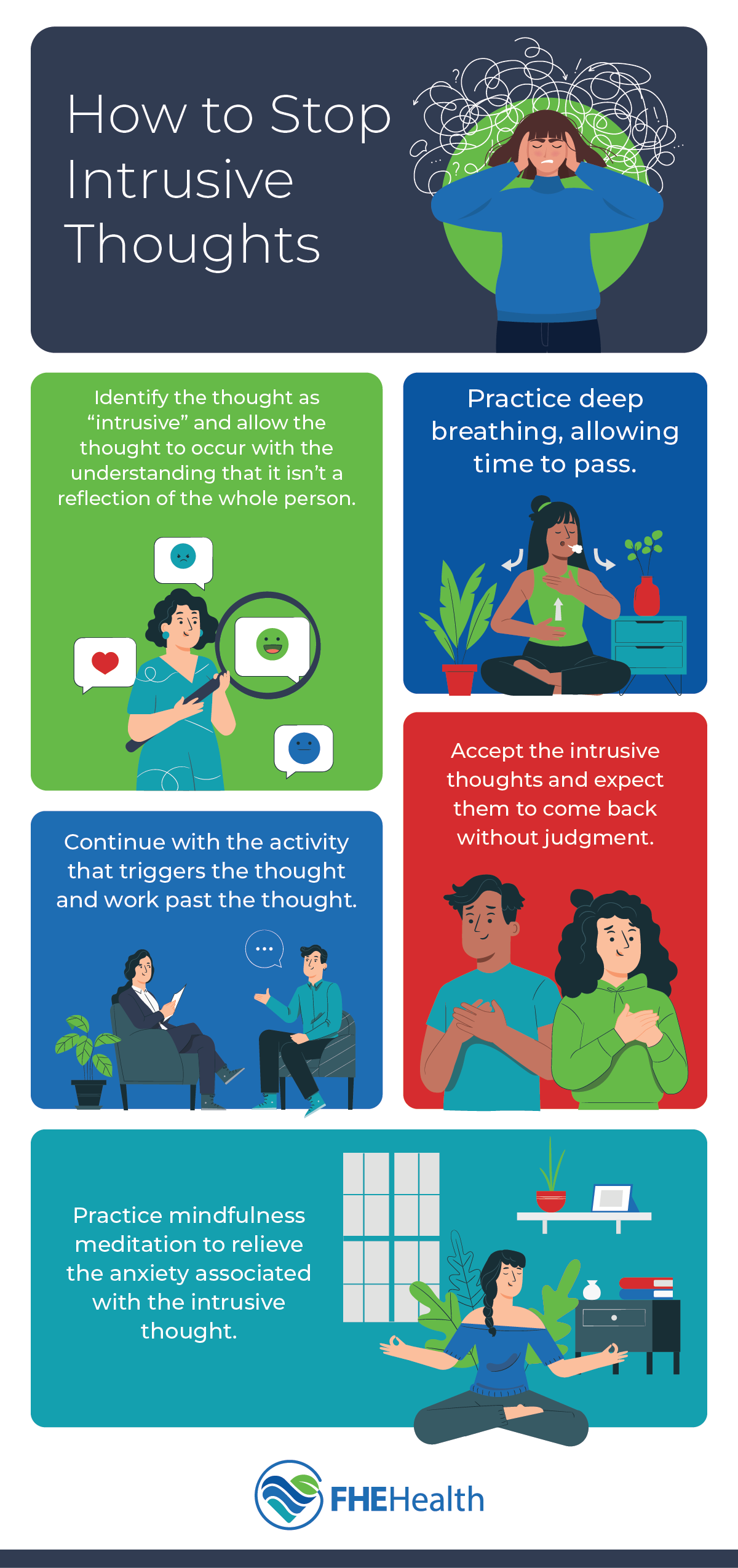
Many parents understand what it’s like to have terrifying thoughts that won’t go away about their child being harmed. Everyone experiences moments of frustration or anger when a violent thought creeps in and then subsides. It’s common to experience anxiety and even play out scenarios about failing when trying something new or starting a new job.
For some people, intrusive thoughts present as a short-term issue. For others, they’re a daily challenge. Do intrusive thoughts ever fully go away? It’s not always possible — or even necessary — to completely stop them. The goal is to take away their power.
What Are Intrusive Thoughts?
According to a global study cited by the Mayo Clinic, about 94 percent of people report experiencing intrusive thoughts. These are thoughts that suddenly enter a person’s consciousness, seemingly out of nowhere, and create a jarring reaction. People with chronic intrusive thoughts may experience these cognitive sensations as intense anxiety. They may also struggle with spiraling fears that cause the thoughts to intensify and create extreme distress.
What we do know is that intrusive thoughts don’t reflect your actual desires or intentions, and having a thought doesn’t mean you’ll act on it. Other common misconceptions about intrusive thoughts are that only those with mental health disorders have them or that they reflect your morality. None of these are true, but having intrusive thoughts can affect your mental health because they can be very distressing and potentially lead to worsening anxiety and depression.
Understanding Intrusive Thoughts
While everyone experiences some degree of intrusive thoughts at times, disturbing thoughts cause great distress and consistently recur. These can trigger intense feelings of worthlessness, guilt, and shame.
Intrusive thoughts that won’t stop can occur for no particular reason. Some experts believe intrusive thoughts manifest in rebellion against the things we’d never actually do. Other experts believe intrusive thoughts reveal underlying issues in relationships or stability. As our brains wander and are influenced by our surroundings, strange thoughts can occur and linger.
Intrusive thoughts have been documented after the following diagnoses:
- Brain trauma
- Parkinson’s disease
- Dementia
Intrusive thoughts are also associated with certain mental health conditions, covered below.
Psychological Origins
Those with anxiety or who have experienced trauma may be more likely to have chronic intrusive thoughts. However, when intrusive thoughts or obsessions become uncontrollable to the point that they’re affecting daily functioning, obsessive-compulsive disorder may be the explanation.
OCD intrusive thoughts that occur repeatedly throughout the day are unhealthy and interfere with quality of life. People with OCD intrusive thoughts may experience:
- Fearful thoughts of being contaminated by germs
- Checking and rechecking locks
- Excessive focus on religious or moral thoughts
- Fearful thoughts about not having life’s necessities
- Consuming thoughts about things not being in order
- Excessive thoughts about superstitions
- Fixations on situations that are outside of the person’s control
When your thoughts interfere with responsibilities and relationships, it’s time to seek help for OCD.
Types of Intrusive Thoughts
Intrusive thoughts can manifest in a variety of formats and themes, but they commonly center around:
- Aggressive or violent thoughts, such as pushing someone in front of a train or hurting a child
- Sexual intrusive thoughts, often related to sexually deviant behaviors
- Religious or blasphemous thoughts, such as repeated thoughts that you’re not praying correctly and will be punished because of it
- Health-related or contamination fears, such as obsessively worrying about or trying to prevent a serious illness like cancer
Causes and Triggers of Intrusive Thoughts
It’s possible that there are neurological and biological factors that can increase a person’s risk of chronic intrusive thoughts. For example, one study found that those with a stronger inner speech process may be more likely to experience habitual intrusive thoughts. Genetics may also play a role. Those who are perfectionists, highly sensitive to the surrounding environment, or more naturally anxious may have a greater risk of intrusive thoughts.
Intrusive thoughts connected to traumatic events may occur in people who live with post-traumatic stress disorder (PTSD). For example, a survivor of a severe car accident may experience intrusive and even obsessive thoughts that prevent them from wanting to travel by car.
Social or cultural pressures can also play a role. For example, people who have eating disorders often experience intrusive thoughts on an ongoing basis relating to food, control, and body image. They constantly think about calories and their impact, and they may have obsessive thoughts about realizing an impossible cultural beauty standard.
Effective Management Strategies
Most of the treatment modalities for intrusive thoughts revolve around accepting them as a normal part of being human and managing the distress around them.
Cognitive Behavioral Therapy (CBT)
Cognitive behavioral therapy is a form of psychotherapy that’s particularly helpful for treating thought disorders and focuses on cognitive restructuring. Many studies show CBT is at least as effective as other psychiatric therapies and medications.
Through CBT, patients learn effective strategies for responding to intrusive thoughts and becoming less sensitive to them, such as mindfulness-based techniques. A therapist may also work to desensitize the patient by intentionally exposing them to triggers so the intrusive thought can be worked through in a controlled setting, which is a part of exposure and response prevention (ERP) therapy.
Medication and Medical Approaches
In some cases, a psychiatrist prescribes a medication that balances the chemicals in the brain. When someone is diagnosed with OCD, PTSD, or depression, antidepressants, such as selective serotonin reuptake inhibitors (SSRIs), may be effective in alleviating intrusive thoughts. SSRIs work by blocking the reabsorption of serotonin, which means there is more available in the body, which can reduce anxiety and, potentially, intrusive thoughts.
Daily Habits and Lifestyle Adjustments
Whether it’s yoga, meditation, massage, or another form of self-care, soothing the mind and body can help reduce intrusive thoughts and your response to them. Other important daily habits that can increase mental health and reduce intrusive thoughts include:
- Getting enough sleep and going to bed on a regular schedule
- Eating a healthy diet focused on whole foods
- Limiting caffeine intake
- Exercising regularly
- Journaling
- Spending more time in nature
It can help to remind yourself that all thoughts are temporary. Instead of fighting or wishing them away — which can often make intrusive thoughts worse — see if you can calmly observe and acknowledge them. It takes practice, but you can build resilience by repeating positive affirmations such as “This is just a passing thought” or “I am a good person.” Mindful meditation apps and visualization techniques may also help ground you with a feeling of control.
When to Seek Professional Help
Several signs can indicate it’s time to seek help for intrusive thoughts that won’t stop. For example, if the thoughts you experience begin to have an impact on your day-to-day life, including your ability to fulfill responsibilities at home and work, you may need professional help. You may also need to seek help if the thoughts increase in frequency and duration, you notice you’re experiencing higher levels of fear and anxiety, or you are at risk of hurting yourself or others.
Living With Intrusive Thoughts
The consensus among mental health professionals is that the best way to reduce intrusive thoughts is to reduce sensitivity to the thought through acceptance and commitment strategies. Try:
- Identifying the thought as intrusive and allowing the thought to occur with the understanding that it isn’t a reflection of the whole person
- Practicing deep breathing, allowing time to pass
- Accepting the intrusive thoughts and expecting them to come back without judgment
- Continuing with the activity that triggers the thought and working past the thought
- Practicing mindfulness meditation to relieve the anxiety associated with intrusive thoughts
These practices can help build resilience and improve your long-term outlook. Should intrusive thoughts persist and cause severe distress or interfere with your quality of life, consider consulting your doctor and seeking professional treatment.
Taking the First Step
Mental health care professionals use a variety of therapies to address underlying causes of intrusive thoughts based on your personal history, the types of thoughts you experience, and whether you have coexisting mental health issues such as depression and PTSD. Many people find it helpful to discuss past experiences that shape their thought lives. However, even if you don’t feel comfortable talking about the events you’ve experienced or the exact content of your thoughts, a mental health care professional can still help you develop the tools you need to feel in control.
Effective treatment and prevention of intrusive thoughts may take time, but patience is key. Establishing and maintaining a treatment plan is imperative and will gradually be effective in alleviating troubling intrusive thoughts. To learn how FHE can help, contact us today.
M






